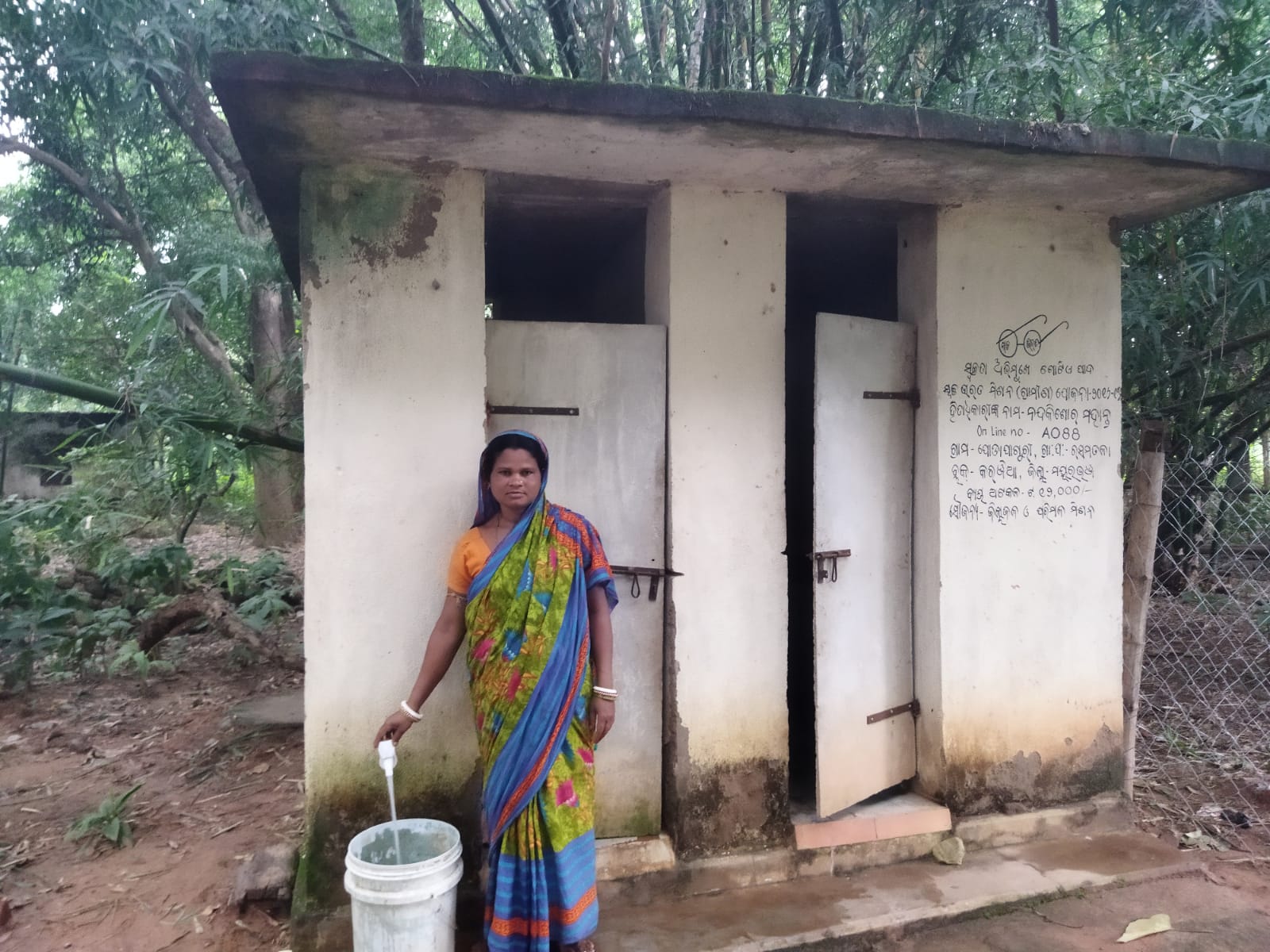Three women’s persistence solves the water crisis in a village
StoryBy Chandrika Patnaik
27 June 2021
Jashoda Mohanta, Rashmi Rekha Mohanta, and Jayanti Mohanta led the charge to prioritise women’s needs, safety, and health of their community and get piped water supply to every household in their village.

Rashmi Rekha Mohanta receives 24*7 water at her home through the community piped water supply system in her village.
Photograph by Parikhita Nayak
Jashoda Mohanta arrived at the village Ghodaghaguri as a new bride in 2012. She was shocked when she realised there were no toilets in her new house. Jashoda was not used to defecating in the open or fetching water from outside. But Ghodaghaguri in the Mayurbhanj district of Odisha faced a severe water crisis.
Jashoda remembers the struggle, “For women, it was a daily struggle to find a safe place in the vacant area next to the pond or defecating along the canal banks. They were not only vulnerable to snake bites but also feared for their safety”. Though the village had seven tube wells, only three had safe water fit for drinking. The remaining four wells provided only muddy water unsafe for drinking and household purposes.
Instead of complaining about her situation, she decided to sensitise others about the need for an in-house toilet. “Young girls go out and defecate in the open. It is not only unsafe but also embarrassing. But men do not understand this,” says Jashoda thinking about her struggle to convince the community to get a water and sanitation system in the village.
Back home in her village, Sialijoda in Keonjhar district, women did not spend hours fetching water. Sialijoda’s women had led the efforts to bring safe water and sanitation to their village community by partnering with Gram Vikas. By 2010-11, all houses in the village had 24×7 household piped water supply, toilets, and bathing rooms. Jashoda knew she had to do the same in Ghodaghaguri.
She began motivating the residents to support her in constructing toilets and bathing rooms (TBRs) in homes and installing a piped water system in the village. “Not everyone agreed at the time. Some 15 families refused to budge. They found the cost of constructing the bathroom and toilets beyond their means. But for Gram Vikas to help us, we had to have the approval of all the residents,” she says.
Like Jashoda, Rashmi Rekha Mohanta and Jayanti Mohanta went door to door explaining the benefits of having piped water at home. Though both women did not receive any support from their husbands, they decided to do daily house visits. Women who wanted to join the campaign were rebuked at home and outside by the men. Men refused to give money for constructing a bathing room and a toilet. They believed that women had, for generations, fetched water for cleaning, cooking, and washing and that it should continue. Some others thought that money spent on sanitation at home was unnecessary and wasteful.
When more women joined them, Rashmi Rekha, Jayanti, and Jashoda persisted with their requests to the village committee for a chance to engage with residents on the sanitation issue during village meetings. After over a year of meetings and convincing, most residents agreed to build a sanitation system for their village. In 2013, the Village Development Committee (VDC) finally agreed and reached out to Gram Vikas.
For 15 families in the village who were not ready to build TBRs in their homes, as they could not afford the cost, the Village Water and Sanitation Committee (VWSC) supported by contributing ₹1000 per household. In November 2014, work on constructing the TBRs started. By 2018, all 101 households of Ghodaghaguri had built their toilets and bathing rooms. The community, with support from Gram Vikas, completed the work on the piped water supply system in August 2021.
Every household started receiving safe water in their three taps. Jayanti Mahanta, a member of the VDC, and Maa Parbati SHG cannot hide her excitement, “Last two weeks have been a dream come true. I can cook meals and serve food to my family on time. My son used to go to his coaching classes in the morning without breakfast as I was engaged in fetching water. I have more time to rear and look after my goats. I am planning to increase my livestock for better income”.
Women members of Ghodaghaguri village in Mayurbhanj district of Odisha are digging for laying of main pipeline.
Photograph by Parikhita Nayak
ACKNOWLEDGEMENT
Reporting and photographs by Parikhita Nayak, Thematic Coordinator at Gram Vikas. Priya Pillai edited the story.
ABOUT THE AUTHOR
Chandrika Patnaik is with the Communications Team at Gram Vikas and leads on content production.
RELATED BLOGPOSTS
Water ushers in a new dawn in the life of Raidih’s farmers
Raidih’s farmers embrace sustainable agriculture and irrigation advancements, heralding a prosperous, water-efficient era in farming.
Gajendra Sahu’s kitchen dreams find wings in his village Adri
Gajendra Sahu transforms his culinary skills into a thriving village enterprise, inspiring Adri’s youth.
From one farmer’s soil to another: how Lochan’s journey in Odisha can inspire us all
Discover how pointed gourd farming reshaped the future for a small-scale farmer in Odisha.